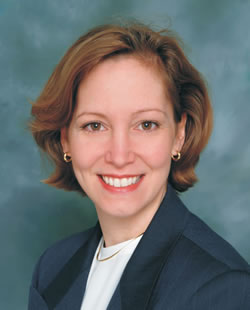American Physical Society Office of International Affairs
Amy Flatten

2012 brought exciting opportunities for the Society to expand its partnerships and develop new collaborations. I will take this opportunity to talk about a few of the highlights of our international activities over the past several months.
In September 2012, a delegation of APS leaders traveled to China for visits with universities, researchers, and institutes throughout China, Hong Kong, and Taiwan. Joining the trip were representatives from APS Headquarters, the APS Editorial office and members of the Committee on International Scientific Affairs (CISA). The Chinese Physical Society’s (CPS) Annual Meeting in Guangzhou served as a cornerstone of the trip, with the APS Vice-President speaking at the first-ever CPS-APS joint scientific session. (http://www.aps.org/programs/international/conferences/cps2012.cfm).
Throughout the trip, the participants endeavored to: 1) identify common areas of interest with Chinese counterparts; 2) establish key contacts; 3) discuss ways APS might beneficially partner with Chinese organizations and institutions; and 4) explore activities to connect and serve our collective physics communities. The group met with representatives from the Institute of Physics, Chinese Academy of Sciences, the Kavli Institute for Theoretical Physics China (KITCP) and visited physics departments of major universities.1 The APS leaders will review and refine some of the common interests discussed during the meetings with the intention of developing new collaborations and strengthened connections with the Chinese physics community.
This past year, the APS continued its partnerships with the Indo-U.S. Science and Technology Forum (IUSSTF) and the Sociedade Brasileira de Física (SBF) to offer the Brazil and India Physics Student and Professor Exchange Programs. These Physics Student Exchange Programs offered graduate students opportunities to attend a short-course or summer institute in another country, or work overseas with a professor in his/her field of study. The Professorship/Lectureship Exchange Programs funded physicists wishing to teach a short course or deliver a lecture series in the other country. We thank the Forum on International Physics for helping to advertise these opportunities!
In partnership with the UK Institute of Physics (IoP) and the Abdu Salam International Centre for Theoretical Physics (ICTP), the Society continues to co-sponsor workshops designed for physicists and engineers from developing countries who are interested in learning entrepreneurial skills, as such an educational program is missing in many of the developing countries. This past year, we co-sponsored workshops in Ethiopia and at the International Centre for Theoretical Physics.
The APS renewed its partnership with the European Physical Society (EPS), the UK Institute of Physics (IoP), and the German Physical Society (DPG) to continue the SESAME Travel Award Program that supports training opportunities for scientists in the Middle East. The SESAME project--the synchrotron light source in Amman, Jordan, brings together physicists from Arab countries and Israel for international scientific collaboration.
The Society continues to bring international physicists to speak at APS meetings through both the Marshak and Beller Lectureships, which support distinguished physicists from the developed and developing countries respectively. The Society also continued its ongoing commitment to developing country physicists through its International Travel Grant Award Program (ITGAP), which supports developing scientists’ travel to visit collaborators in developed countries. The Forum on International Physics launched this program and it now enjoys the financial support from nearly every scientific Division of the APS!
The Society continued its collaboration with the AAAS Science and Human Rights Coalition--a network of professional societies providing strengthened connections between the human rights and scientific communities. Through this Coalition, the APS stressed the need for scientific organizations to advocate for the human rights of scientists in the U.S. and around the world.
The above are just a few highlights of the past year, and as many of you may know, the recently completed APS Strategic Plan identified “expanding the Society’s international engagement,” as a key priority. Consequently, I am extremely enthusiastic about the upcoming year and especially want to thank the members of FIP, as you have been partners in many of the aforementioned efforts to build new programs that serve APS members, and provide new opportunities for physicists worldwide.
Dr. Amy Flatten is Director of International Affairs at the American Physical Society.
1 Nanjing University, Fudan University, Shanghai Jiao Tong, Hong Kong University of Science & Technology, Chinese University of Hong Kong, and National Taiwan University
Disclaimer - The articles and opinion pieces found in this issue of the APS Forum on International Physics Newsletter are not peer refereed and represent solely the views of the authors and not necessarily the views of the APS.
